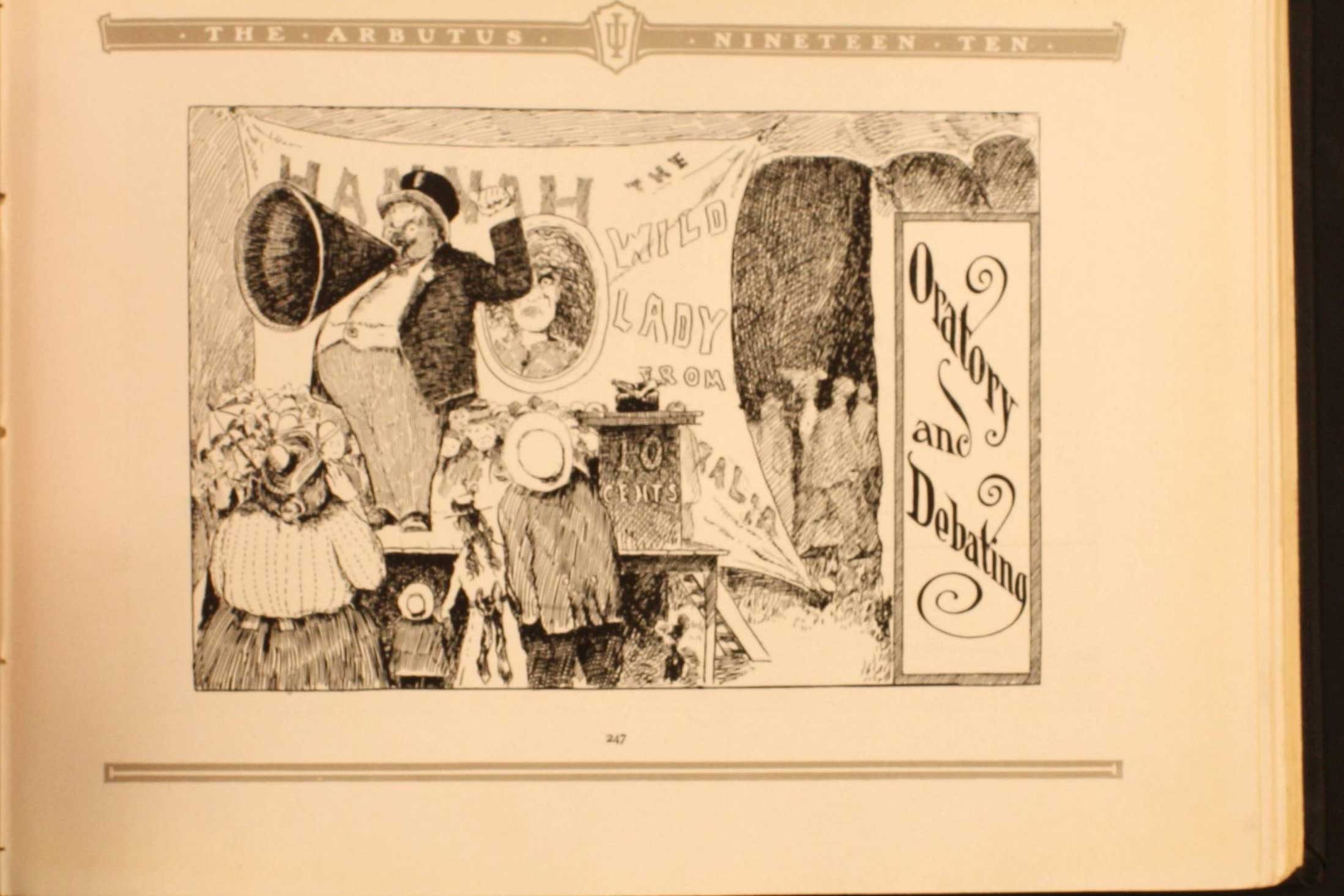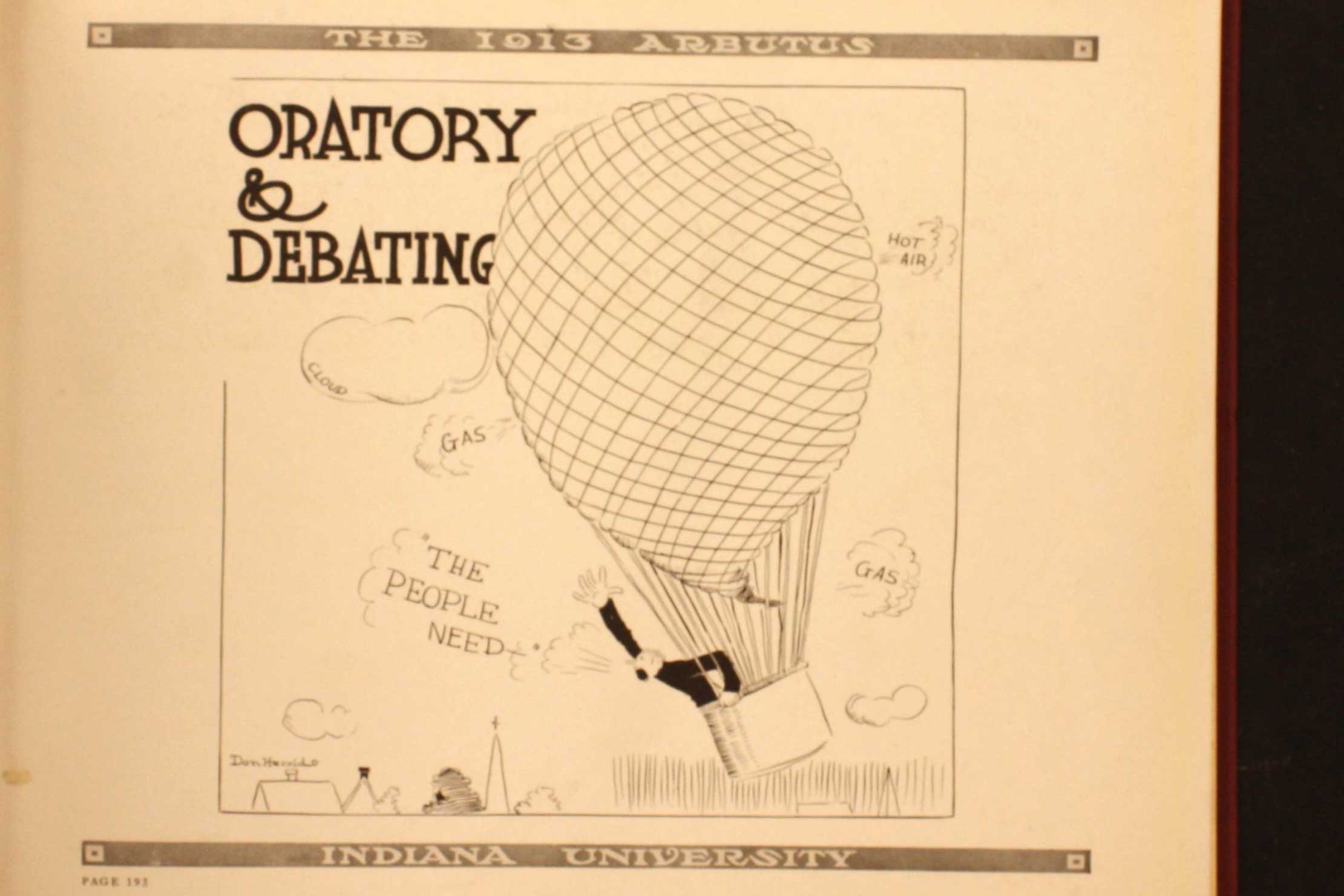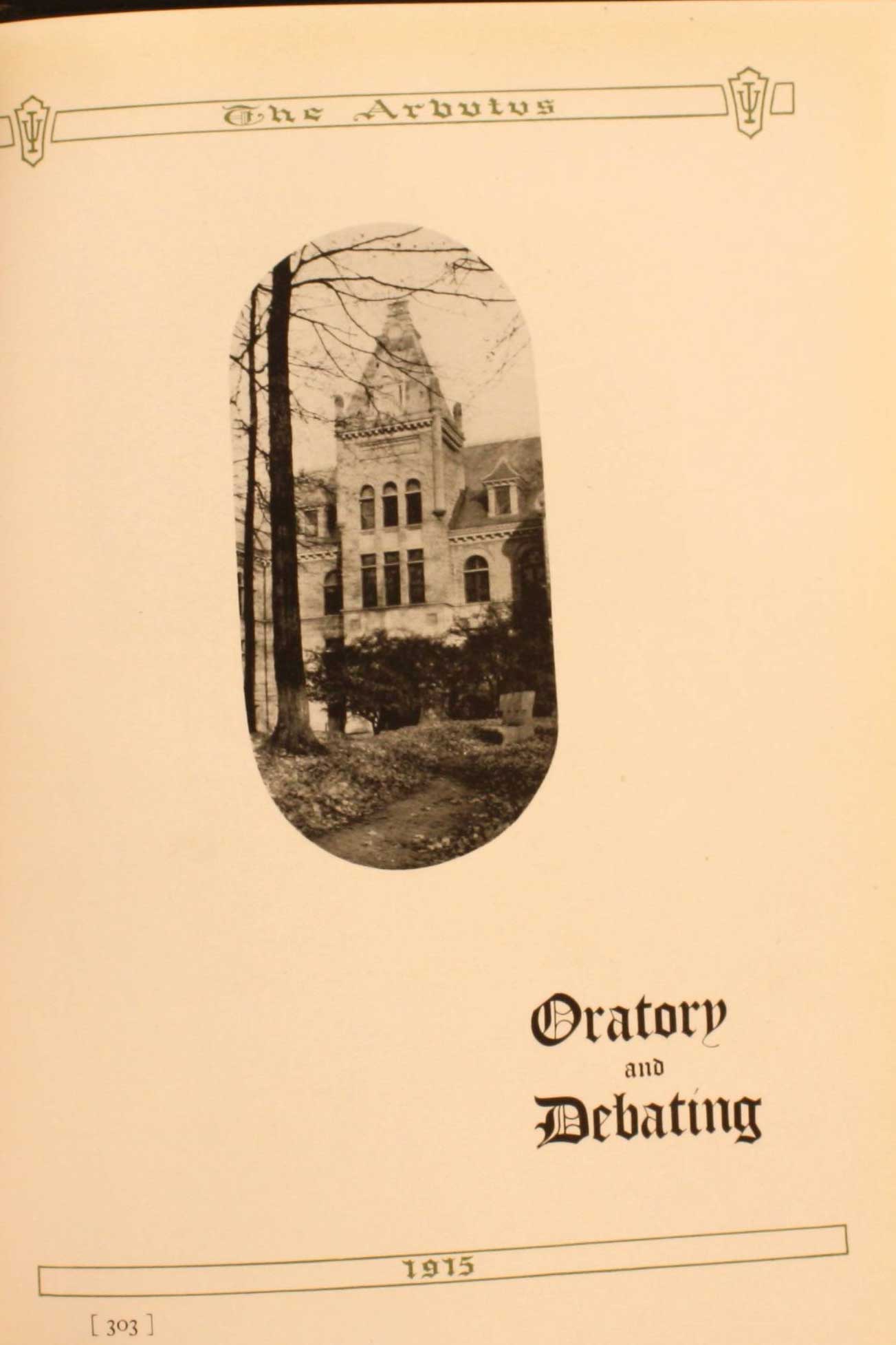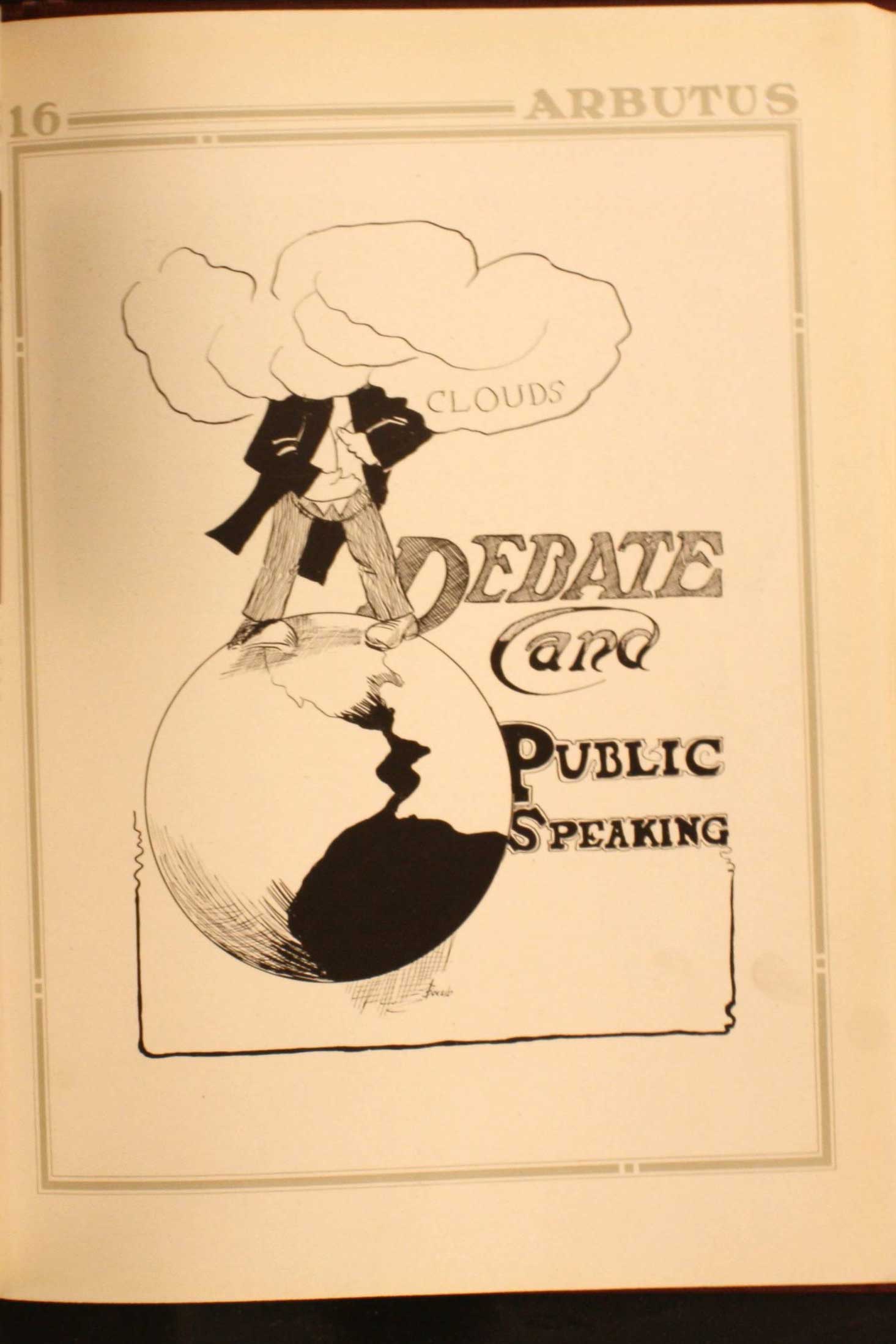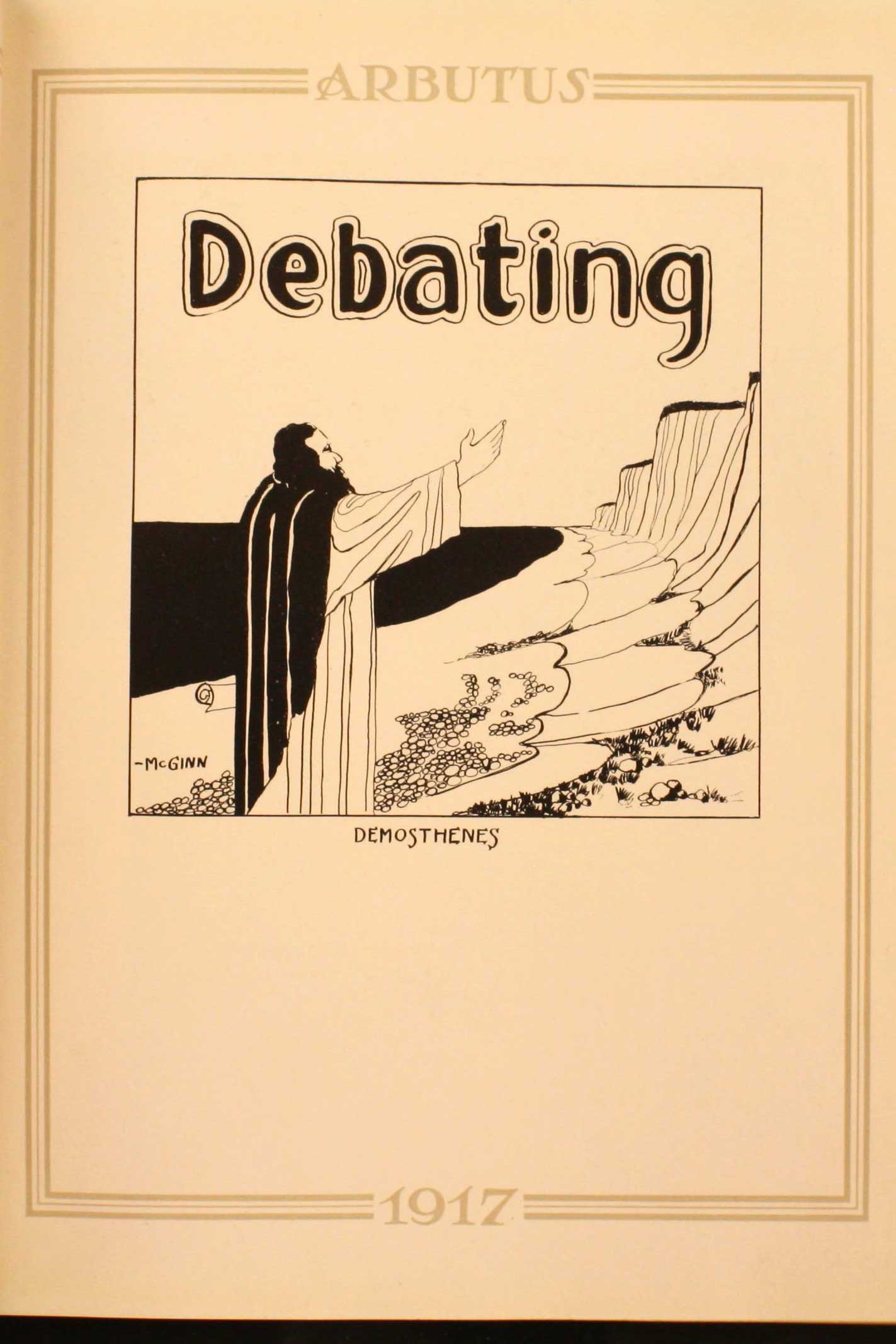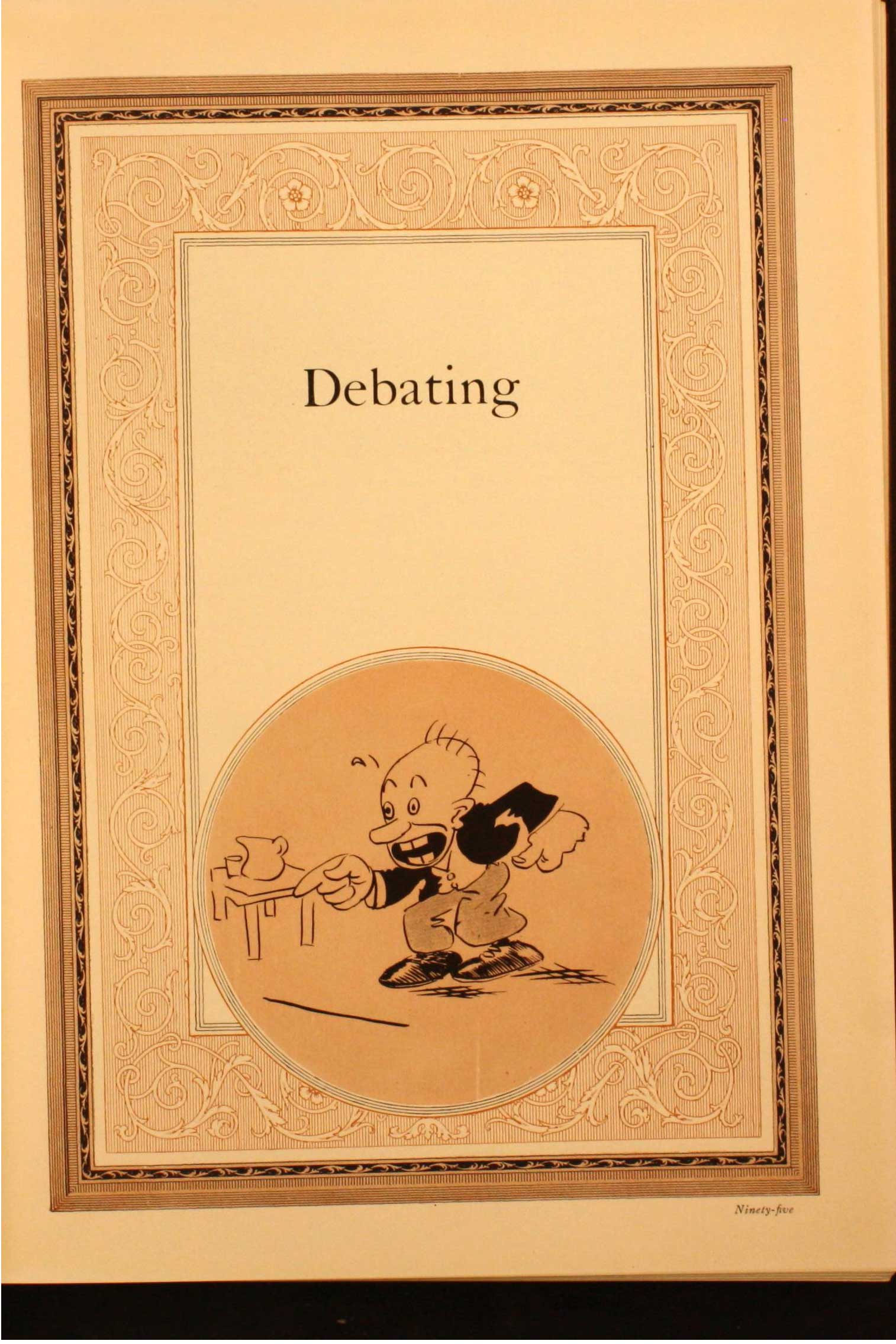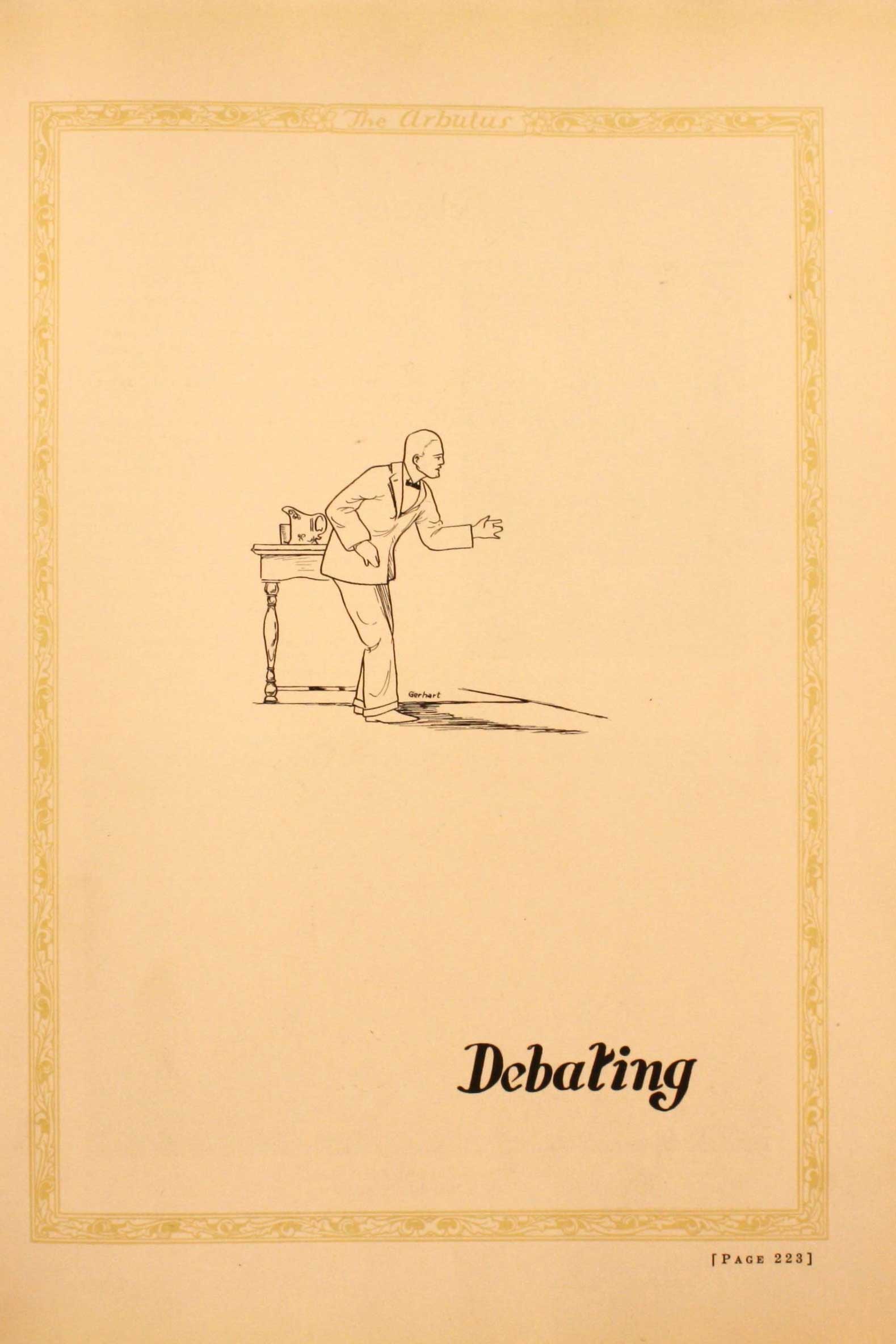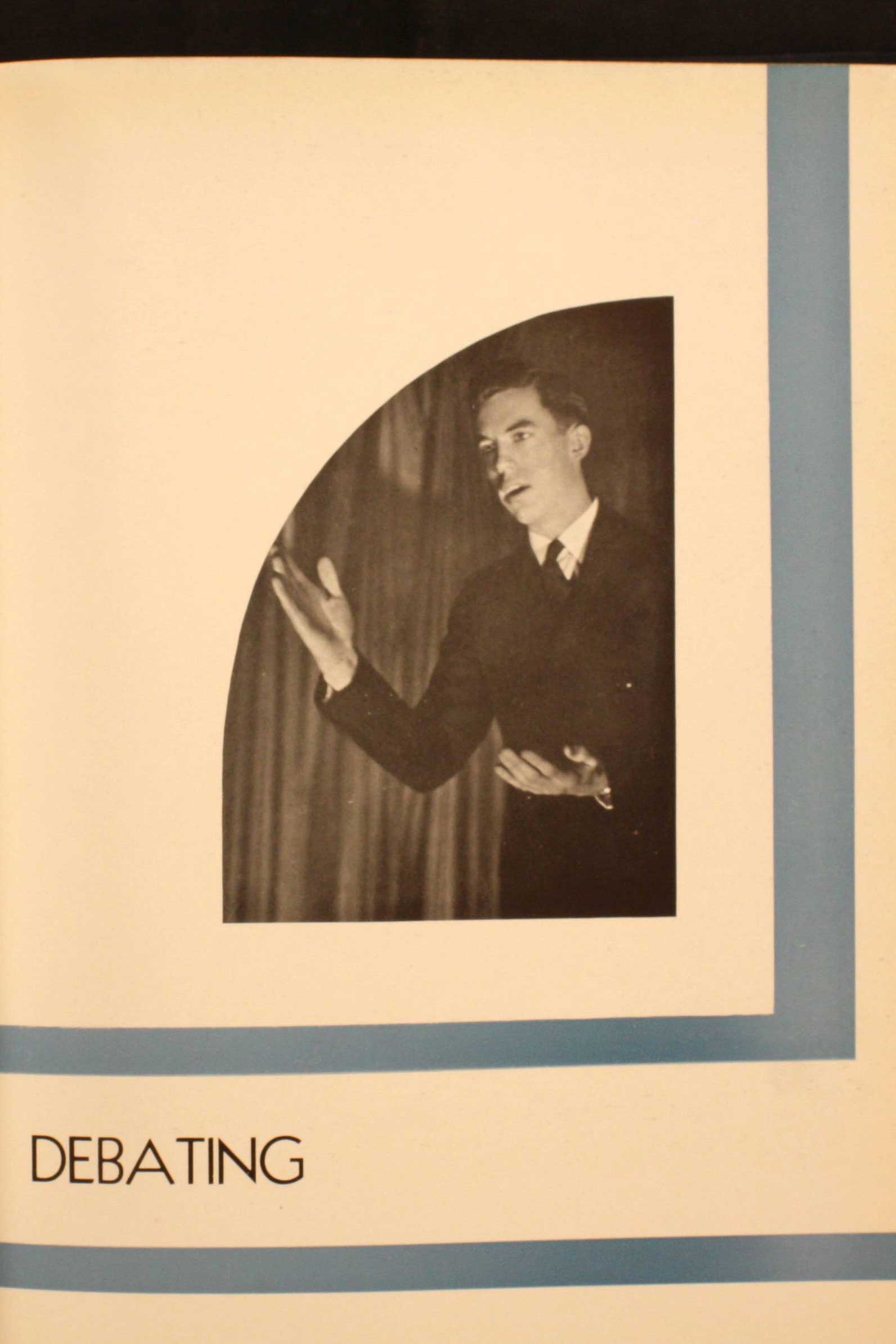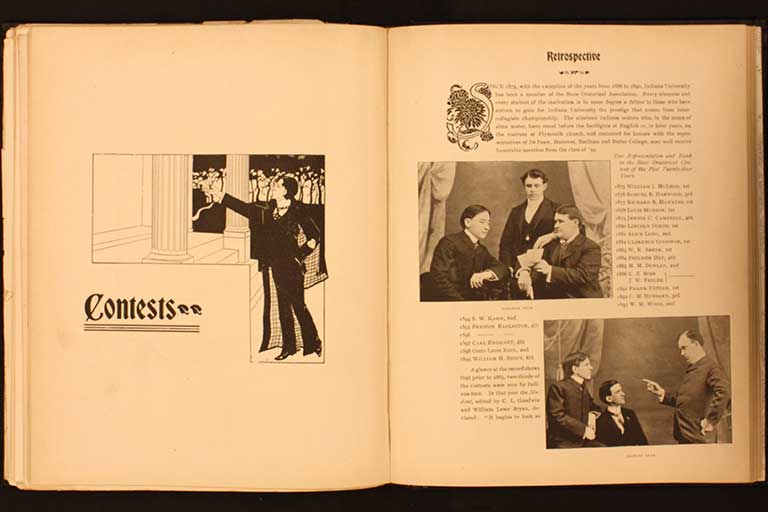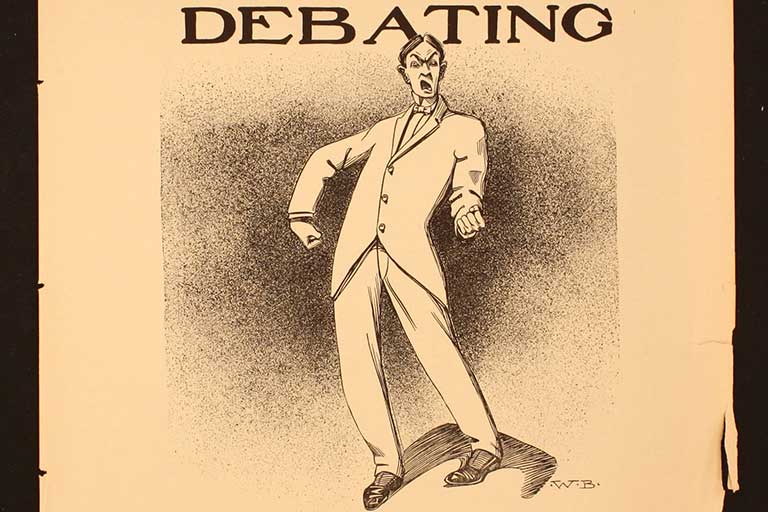| 1825 | A year after classes started in the Seminary Building, literary societies began. Of the activities included in a literary society, “debate was the most popular and was generally the centerpiece of the meetings.”(Cite) |
| 1875 | Indiana University becomes a member of State Oratorical Association. Literary societies begin to lose popularity while the speech and debate team are esteemed |
| 1892 | The first intercollegiate debate in the US occurred in the United States between Yale and Harvard in 1892. (See Nichols 1936). |
| 1893 | IU’s first intercollegiate debate against Depauw University. The subject of the debate was Resolved: "That the free and unlimited coinage of silver and gold at the ratio of 16 to 1 by the United States would be preferable to a continuance of a single gold standard, assuming that an international agreement for bimetallism is out of the question." (The Student 2/25/1896) |
| 1896 | IU continues intercollegiate debates with Depauw University. 1897 and 1898 IU debated Butler. (1904d). |
| 1897 | Indiana debates the University of Indianapolis over compulsory arbitration on interstate railroads. |
| 1898 | Becomes member of Central Oratorical League. Includes: Cornell, West Virginia Univ, Ohio State Univ, Ohio Wesleyan University, University of Illinois. |
| 1899 | Oratorical Associations of Indiana University and Illinois University agreed to three annual debates. Debate teams are comprised of two teams of three individuals, one negative and one affirmative team. (1902c) |
| 1901 | Willis ‘O Taylor represents IU as the first documented African American champion of the State Intercollegiate Oratory Contest. |
| 1902 | Debates Illinois on whether Cuba should be annexed (1902c). A $50.00 campus oratory competition is established. Five speakers are nominated by faculty. Law school students establish the Reinhard club. The club’s purpose is “debating and extemporaneous speaking.” Limited to 15 students. |
| 1903 | The campus debate student organization, The Wranglers, is established. They meet weekly. Organization is limited to thirteen debaters. IU-Illinois debate whether the US should establish trade reciprocity with Canada. Director of Debate John Clapp |
| 1905 | 42 students competed in the inter-class Oratory competition. Winners were designated by class (Fresh/Soph/Junior/Senior). (1905b) |
| 1906 | Intercollegiate debates expanded to a “Tri-State” league or triangle debates, including IUB, Ohio State University, and Illinois State. The law student group debated Louisville. 50-60 students participate in public speaking and debate competitions on and off campus. (1906b). Debate again Ohio and Illinois was on whether Life Insurance should be regulated as commerce and subject to state control. The Louisville-IU law debate asked, “Ought the negro to have been enfranchised?” |
| 1908 | Triangle debate resolution was “Resolved: That all Japanese and Chinese Laborers Should be Excluded from the United States by Law.” |
| 1909 | 50 students tryout for this year’s debate team. Triangle debates: Resolved that Congress Should Immediately Provide for the Strengthening of the Navy.” |
| 1910 | Triangle debates: Resolved, That a Progressive Income Tax Would Be a Desirable Addition to the Federal System of Taxation. |
| 1912 | IU joins a 2nd triangle league with Wabash College and Notre Dame. IU also debated Depauw University. |
| 1913 | Ohio/Illinois debate continue along with debates against Depauw, Wabash and Notre Dame. Coached by Ralph Sollitt. |
| 1914 | Women are included in the first “Girls’ Discussion” competition. Triangle debate: Resolved: That a policy of fixing a minimum wage scale by state boards is desirable. The 2nd Triangle league includes Depauw and Earlham. |
| 1915 | Triangle debates with Ohio/Illinois continued (Arbutus called it “Old fashioned”). Depauw/Butler/IU “extension” debate competition includes the innovation of expanding the number of participating teams to 12! IU Joins Tau Kappa Alpha, the national honorary debating and oratorical society. TKA was founded by Butler. |
| 1916 | Triangle debates end, titled “old method of debating.” Fourteen “Extension Division” debates are scheduled with Depauw and Butler in Fourteen cities in Indiana. Judged by public audiences. |
| 1917 | The Indiana Debating League student organization is formed to increase enthusiasm for debate activities. Herman T. Briscoe was the founding president. He eventually became the IU Vice President and Dean of Faculties. Extension debates continue around the state vs. Depauw and Earlham. |
| 1921 | State triangle Debates had eleven teams entered. IU debated Purdue, Depauw, Ohio State and Notre Dame on the question of Resolved: That the Federal Government should own and operate all the coal mines in the United States, constitutionally granted and waiving the question of transportation.” Beaulah Radcliffe is the first documented female debate team member. |
| 1923 | Triangle debate returns with Ohio State and West Virginia university. Extension debates continued with IU debating, Depauw, Wabash, Notre Dame, and Huntington college. Professor H.M. Karr identified as coach. |
| 1924 | Coed debate society established. 50 students tried out, 16 team members selected. C. M. Niezer, debate alumnus, established the Niezer medals. Each member of the debate team receives a gold medal with their name and the debate that they participated in engraved on it. |
| 1925 | Indiana goes west! A team of three debated Univ. of Oklahoma, Colorado, Kansas, William Jewell, and Colorado State. Interest in debate is high but considered a struggle during the post-football era. Professor Karr departs as coach. Walter Helmke identified as assistant coach. Coed debate team debates Univ. of Cincinnati on Resolved that the Japanese Exclusion Act of the Johnson Immigration Bill Should Be Repealed. |
| 1926 | IU debates Cambridge in Bloomington. A crowd of 610 voted in affirmative for IU on the question of “Resolved, That This House Favors the Principles of Prohibition.” Coaches Lee R. Norvelle and Joseph Cohen identified. Coed team enters a Coed debating league known as Indiana-Michigan-Ohio League. |
| 1927 | IU debates Univ. of Sydney. Topic Resolved: Capital Punishment Should Be Abolished.” |
| 1928 | IU join Phi Delta Gamma professional forensic society. Coed team debates Illinois and Michigan. International teams included Univ. of London, Univ. of Edinberg, and Univ of Reading, and the Philippines. Norvelle still head coach, Jasper Garland assistant coach. |
| 1929 | Start of the Big Ten Debating League. IU is “Co-champion.” Start of intramural competition with Neizer awards to the winners. Alphi Chi Omega and Delta Epsilon win intramural debates. Intercollegiate debates occurred with Depauw, Miami, and Butler. No international debates held. Donald Bowen named as assistant coach. |
| 1930 | The team competes in 17 debates in the Big Ten Conference and non-conference members, Marquette, Louisville, Depauw, Florida, Miami, St. Louis, and Loyola. Lee R. Norvelle titled “Director of Dramatics.” Alpha Chi Omega and Delta Chi win Neizer trophies in intramural debates. |
| 1931 | Donald Bowen new debate coach. International debate returns against Cambridge University. Radio debates start against Univ. of Cincinnati, and Chicago Kent College over WGN. |
| 1932 | Debated Illinois, Wisconsin, Murray State Teachers college, Northwestern, Minnesota, and Yale. International debate against Oxford. (1932 a, Picture of Neizer trophies) |
| 1933 | Coed debated Northwestern. Men placed 3rd in Big Ten League. Delta Zeta and Delta Epsilon were intramural champions. |
| 1935 | Seventy-Five students tried out for nine slots. Tau Kappa Alpha, Tau Kappa Alpha and Phi Delta Gamma hold a banquet. Awards were given to top journalist, speech, and debate students. |
| 1936 | New innovation to expand debate team size. Varsity men and women teams and freshmen men and women teams each participated in five intercollegiate debates. Male debaters took part in “Conference debates.” A fall conference and spring conference tournament was held. The fall resolution, Resolved: that the several states enact legislation provided for medical care available to all citizens at public expense. Spring resolution at the University of Chicago tourament, “Resolved: that congress should be empowered to over-ride, by two-thirds majority, Supreme Court decisions declaring federal laws unconstitutional.” Coed team debated Illinois and Michigan. |
| 1939 | Tied for 4th in Big Ten Conference debated Resolved, That the United States should form an alliance with Great Britain.” The mens team participated in 45 debates over the season. The women’s team joined an “independent” part of the Big Ten Conference. They debated Northwestern, Illinois, Purdie, and Ohio State. Types of debate included, radio, open forum, and conventional Oxford style. |
| 1940 | Team included twenty-nine members and more than one hundred debated during the season. The men’s team debated government ownership of railroads and US isolationism. The women’s team debated whether anti-democratic organizations should be suppressed as well as whether the Federal Housing Administration should be renewed. |
| 1943 | Competing despite the nation’s “transportation difficulties.” Debate Coach Dr. Larson named. |
| 1944 | 8 squad members competed. Five women debated at a Northwestern Tournament. The Big Ten Conference resolution this year “Should the United States cooperate in maintaining an international police force upon defeat of the Axis?” |
| 1946 | Eugene C. Chenoweth became Director of Forensics or otherwise known as the debate coach. Will direct the team until 1960. Auspiciously started the annual Hoosier Debate Tournament (See 1961 note). |
| 1948 | IU Hosts the 8th annual National Tau Kappa Alpha Discussion conference. |
| 1958 | Debate and Delta Sigma Rho national forensics honorary. |
| 1960 | The team travelled to Wayne State, Bowling Green College, and State University of Iowa. Debated resolved: That Congress should be given the power to reverse Supreme Court decisions. Coached by Professor Robert Jeffrey. Consists of Intra-University and intercollegiate competitions. |
| 1961 | 15th annual Hoosier Debate Tournament, included seventeen Midwestern schools and the University of Toronto. Debated the NDT topic. |
| 1970 | Bill Starosta of the Speech and Theater department named coach. |
| 1993 | Indiana Debate qualifies to their first NDT |
| 2009 | Indiana Debate returns to campus with support from SPEA, COAS, Kelley School of Business and OVPUE. |
| 2014 | Indiana Debate hosts NDT and CEDA on Bloomington Campus |
| 2016 | Indiana Debate qualifies two teams to the NDT. |
